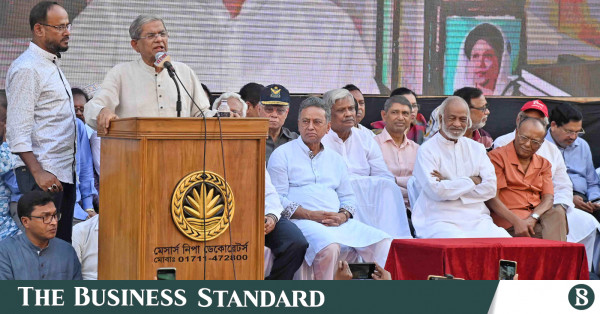Despite harbouring doubts and reservations about the government and certain other political actors, the BNP has opted for a strategy centered on cultivating a positive image by steering clear of confrontational politics to enhance its public image and build trust.
Party leaders said their aim is now to build public trust, demonstrating that the BNP can foster a positive political culture and will not emulate the actions of the Awami League if voted to power again.
In a recent standing committee meeting, BNP Acting Chairman Tarique Rahman emphasised the importance of enhancing the party’s reputation through positive actions, statements and the conduct of its rank and file.
The BNP policymakers also agreed that, despite their reservations and discontent over some actions and statements by the interim government, student leaders of the mass movement, and certain Islamist parties, particularly Bangladesh Jamaat-e-Islami, the party should avoid confrontation. Instead, they should handle the situation tactfully, a BNP standing committee member told UNB.
He said the BNP aims to maintain a warm relationship with the government in order to persuade it to hold the national election as soon as possible, following necessary reforms to the electoral process, administration, and judiciary.
The BNP leader, however, said their party would continue to exert pressure on the government through political statements and divisional rallies, seeking a clear roadmap for the national election.
He also described the formation of the Election Commission as a positive step by the government towards preparing for the national election.
Another BNP standing committee member said they will respond to the interim government’s proposals for reforms in various areas, including the Election Commission (EC), in the interest of ensuring a free, fair, and impartial election.
The Electoral Reforms Commission has already requested proposals from 22 political parties and alliances, including the BNP, on potential reforms to the electoral system.
“This matter was thoroughly discussed at our standing committee meeting on Tuesday (19 November) night. We have decided to submit our reform proposals to the government on several key issues,” the BNP leader said.
Besides, he mentioned that the party has begun organising workshops on BNP’s 31-point state reform outline across all divisions, with the first one held in Dhaka on Tuesday, to generate public support.
The BNP policymakers also said they have taken steps to improve relations with student leaders of the mass movement, staying in regular contact with them, as they believe Jamaat has already developed a connection with them. “We will adopt the same approach towards Jamaat, as we are not seeking confrontation with the party, especially with the upcoming elections in mind.”
BNP Secretary General Mirza Fakhrul Islam Alamgir, speaking at a programme on Monday, warned party leaders and workers not to distance themselves from the students who played a pivotal role in the movement that brought down the Awami League regime.
He acknowledged that while the BNP had endured torture and harassment for 17 years, it was ultimately the students who played a crucial role in ousting Sheikh Hasina’s government. “We must not create any distance with the students. We should think about it. Students are saying many things, and they have that right.”
Talking to UNB, Fakhrul emphasised the importance of maintaining unity among all stakeholders in the student-led uprising to consolidate its success and guard against any attempts to destabilise the country and undermine the nation.
He also warned of a deliberate effort to disrupt the unity between political parties, students and the public. “We cannot allow this to happen. We must all stay vigilant.”
The BNP leader suggested that the interim government should focus exclusively on reforms in the electoral process, administration, and judiciary to ensure a credible national election within a reasonable timeframe.
He expressed concern that any delay in the election could worsen existing problems and provide opportunities for vested interests to engage foul play.
Fakhrul also stated that BNP will continue to support the interim government to ensure its success for the nation’s benefit.
Regarding BNP’s relationship with Jamaat, he emphasised that there is no visible distance between the two parties, but highlighted that BNP and Jamaat have entirely different political ideologies and ideals.
When asked whether Jamaat would be part of BNP’s coalition in the next election, he said, “It’s too early to say. We will assess public opinion before the election and decide whether we will participate independently or as part of an alliance.”
BNP standing committee member Iqbal Hasan Mahmud Tuku said the interim government, political parties and student leaders must remain united to restore democracy and protect people’s voting rights.
He said the youth who led the mass uprising, along with the wider public, have been deprived of their right to vote. “Restoring people’s rights to franchise is the current government’s primary duty,” he asserted.


